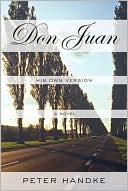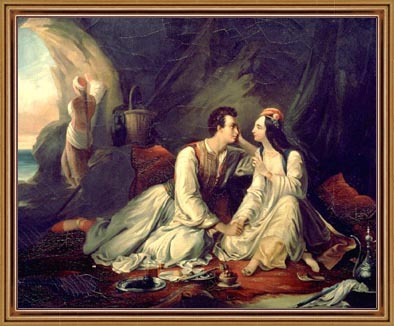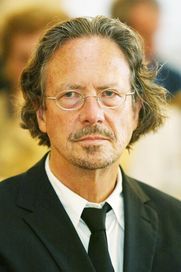The narrator of this tale is a former master chef who lives in his run-down failed inn. The time is the present. Don Juan appears suddenly, hurtling over his garden wall, pursued by a couple on a motorcycle. For the next seven days, Don Juan enjoys his host’s cuisine, sits with him in the garden and tells stories about his experiences during the previous week – in Tblisi, Damascus, North Africa, Norway and Holland. He had been accompanied on the road by his amorous driver/servant.
 But Handke’s Don Juan is not a book of sexual exploits. “Don Juan is no seducer,” says the narrator. “He had never seduced a woman. He had certainly run into some who had accused him of doing so. But these women had either been lying or no longer knew what they were thinking, and had actually intended to express something altogether different. And conversely, Don Juan had never been seduced by a woman.”
But Handke’s Don Juan is not a book of sexual exploits. “Don Juan is no seducer,” says the narrator. “He had never seduced a woman. He had certainly run into some who had accused him of doing so. But these women had either been lying or no longer knew what they were thinking, and had actually intended to express something altogether different. And conversely, Don Juan had never been seduced by a woman.”
“Don Juan forbade me to interrupt with questions and comments,” says the narrator. “Altogether, I should become more unquestioning, he remarked.” This is Handke’s implied imperative as well, since the leisurely pace, calmness of tone, and the whiff of the magical are intended to deliver us into a different sense of time and an alternative profile of Don Juan, who pulls remarkable delicacies out of his pockets for the chef and and appears to send fluffy poplar seeds into the air wherever he goes. As for the going, he prefers to walk backwards.
 Don Juan had stumbled upon the motorcycle couple having sex outdoors. But he “felt disappointed by the couple in the end. The whole thing turned all too predictable.” A week later it occurs to him “that the labiate flowers on the broom branches framing the couple has been intensely yellow.” So, if Don Juan’s stories will not have “piquant details,” then what is he trying to do as a storyteller?
Don Juan had stumbled upon the motorcycle couple having sex outdoors. But he “felt disappointed by the couple in the end. The whole thing turned all too predictable.” A week later it occurs to him “that the labiate flowers on the broom branches framing the couple has been intensely yellow.” So, if Don Juan’s stories will not have “piquant details,” then what is he trying to do as a storyteller?
Don Juan: His Own version is a novella about space and time. Its delicate, subtle pleasures come from our own acquiescence into an almost inexpressible but certainly sorrowful sense of existence through vast distances, incongruent time zones, and the strangeness of encounters with women. The latter, of course, can’t be mentioned here since Don Juan would want you to discover them for yourself.
Joel Agee critiqued the novel in the New York Times for lacking “a more fully realized fiction … the book left me wanting to hear again Mozart’s treatment of the same theme. That music has everything Handke’s prose lacks: brio, verve, declarative intensity, a vast range of emotion and, last but not least, brilliant joyful virility.” But neither Mozart nor Byron nor anyone else has proposed “the same theme.” For such a lover of Mozart, Agee exhibits a tin ear. Where Mozart’s Don Giovanni meticulously counts his “mille et tre” conquests, Handke’s Don Juan falls into a sort of autistic counting of objects only when he falls out of “womantime” – he would never tally up his women. Don Juan must be considered on its own lyrical terms, and they are most rewarding.
If you insist on the conventions of “fully realized fiction,” you may not appreciate prose like this:
“Sorrowing was something that made him impetuous, and, in an opposite and equal reaction (or rather action by action), completely permeable and open to whatever might happen, while at the same time invisible when necessary. His sorrow furnished provisions for his journey. It nourished him in every respect. As a result he had no major needs … His sorrowing, fundamental rather than episodic, was an activity.”
Thirty pages later, the narrative resonates with the echo of this elemental sadness. Here, Don Juan and his lover in Damascus have experienced a sandstorm, now ebbing:
 “In the midst of all this Don Juan’s heart was almost breaking from sorrow. But precisely this restored his strength. It allowed a person to transcend himself. The sorrow made one leave the personal behind. And its presence worked wonders. In the midst of the darkness and the storm, colors appeared. In the foliage of a half-stunted cherry tree in the rubble, the red of cherries suddenly became visible above the couple, without any obvious source of light.”
“In the midst of all this Don Juan’s heart was almost breaking from sorrow. But precisely this restored his strength. It allowed a person to transcend himself. The sorrow made one leave the personal behind. And its presence worked wonders. In the midst of the darkness and the storm, colors appeared. In the foliage of a half-stunted cherry tree in the rubble, the red of cherries suddenly became visible above the couple, without any obvious source of light.”
Don Juan’s womantime “meant again and again: one had time. Was in time. In accord with time.” In his moments with women, Don Juan and the lady experience time as congruent and shared. “But what had the most immediate effect during the entire week was Don Juan’s obvious temporal alignment with her, the other person, which at first sight caused her to experience herself not as the other, just as she no longer perceived him, the stranger, as the other. If there was anything the woman could trust, it was this alignment.”
 The source of Don Juan’s sorrow clarifies. His sense that this will be “the last time for an indefinite period that he would register all the allegedly small or insignificant things that for an entire epoch had meant the world to him” has the effect of both persuading us to pay strict attention to his every word and to incline us to recognize our own sadness-in-time. Don Juan is ambitious in the very slightness of its weight, its hesitancy to spout wisdom. Peter Handke’s novella offers unexpected impact and insight. If one listens.
The source of Don Juan’s sorrow clarifies. His sense that this will be “the last time for an indefinite period that he would register all the allegedly small or insignificant things that for an entire epoch had meant the world to him” has the effect of both persuading us to pay strict attention to his every word and to incline us to recognize our own sadness-in-time. Don Juan is ambitious in the very slightness of its weight, its hesitancy to spout wisdom. Peter Handke’s novella offers unexpected impact and insight. If one listens.
[Published by Farrar Straus & Giroux on February 9, 2010. 101 pages, $22.00 hardcover]
Handke’s Don Juan
The ‘sorrow’ passage you quote is wonderful, and I’m going to compare it with the original. In fact, I’m now going to read the original, so thank you!
On Time & Seduction
Thank you for the review. The book sounds both very subtle and very excellent. I’m thinking that, not to put too fine a point on it, seduction, even the docking, is largely about time and timing, isn’t it? The temporal delineations that are suggested in Handke’s novel suggest a crisis (or a tension) of alignment that the “sorrowing” is actully trying to catch up with. As we are all seduced by good writers, the tale is told to the chef-narrator, who might well be having his own problems with inspiration — and to the reader/listener who is asked to be quiet and just listen. His “own version” indeed … because it might be ours too.